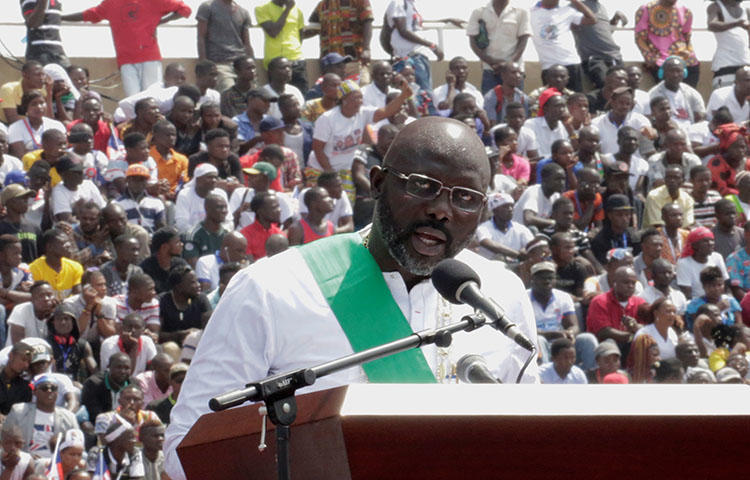New York, April 11, 2018–The Committee to Protect Journalists today expressed concern over a US$1.8 million civil defamation lawsuit against Front Page Africa, a privately owned Liberian newspaper that has long been the subject of complaints and harassment for its critical reporting on successive governments.
The lawsuit relates to an advertisement about land administration published in March by Front Page Africa. Administration of the land at the heart of the notice is in dispute. One of the plaintiffs in the lawsuit, Henry Morgan, was previously affiliated with the Coalition for Democratic Change (CDC) party of President George Weah. Morgan refused to answer questions about his current party affiliation when asked by CPJ.
Rodney Sieh, Front Page Africa‘s owner and a member of CPJ’s Africa advisory group, said he believes the lawsuit and a recent wave of harassment on social media are part of a strategy to silence the newspaper.
“Liberia has a troubling history of libel lawsuits where applicants ask for exorbitant damages simply to harass and intimidate journalists, resulting in their imprisonment or the closure of news outlets,” said Angela Quintal, CPJ Africa program coordinator. “The government should move swiftly to reform Liberia’s libel laws to guard against their abuse in this way.”
Court sheriffs on April 9 delivered a summons to the newspaper’s Monrovia office, briefly detained at least seven journalists, and temporarily shut down the office, Lennart Dodoo, the news editor of Front Page Africa, told CPJ.
Dodoo said that he and six other Front Page Africa staff were held at a Monrovia civil court for three hours in relation to the suit and were released after their lawyer, Pearly Brown Bull, negotiated for a US$350,000 bond to be paid the next day. The staff reopened their offices the same day and the paper has continued to publish, according to Dodoo.
The week before the summons, Jefferson Koijee, a member of Weah’s political party and Monrovia mayor, publicly condemned Front Page Africa‘s critical reporting on the government and lambasted Sieh for “unprofessional attacks on the presidency,” according to media reports.
Furthermore, Sieh told CPJ that a week before the summons was issued, anonymous social media users harassed him and Front Page Africa about the newspaper’s critical reporting and claimed that the paper was anti-government. One post on Facebook threatened arson and included a picture of Sieh’s home, he said.
On the same day as the summons, FPA published on its Facebook page: “[W]e are strongly convinced that the government is definitely behind what happened.”
Liberia’s Information Ministry in a statement released on the same day as the summons denied any connection between the government and the lawsuit. The ministry emphasized the government’s “commitment to free press and freedom of expression.”
Sieh told CPJ that the paper received a request in late March from the lawyers of the now-plaintiffs, asking it to retract the advertisement. The paper published a clarification with further details on the dispute over the land on which the advertisement was based. The paper did not hear from either party in the dispute until police arrived at the Front Page Africa office on April 9 with the summons, Sieh said.
Edwin Morgan, one of the people who submitted the original advertisement and who was also named as a defendant in the suit, told CPJ that at least two other newspapers, The Daily Observer and The New Democrat, had also run the original advertisement. Sieh told CPJ that, to his knowledge, Front Page Africa was the only newspaper to be sued.
Plaintiff Henry Morgan told CPJ, “Whether we are going to go after the other papers [that published the original advertisement] is up to our discretion.”
During a visit to Liberia in March, David Kaye, United Nations Special Rapporteur on the right to freedom of opinion and expression, expressed concern over the consequences of large financial penalties in civil libel suits against Liberian journalists and newspapers.
In 2013, Sieh was jailed for 89 days for not paying $1.5 million in damages in a civil libel conviction related to his reporting, according to CPJ research.
